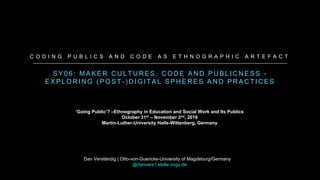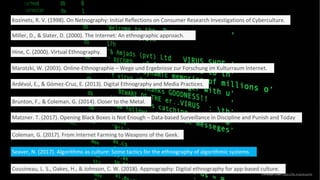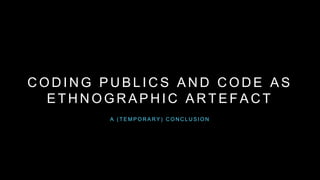Coding publics and code as ethnographic artefact
- 1. C O D I N G P U B L I C S A N D C O D E A S E T H N O G R A P H I C A R T E F A C T S Y 0 6 : M A K E R C U L T U R E S , C O D E A N D P U B L I C N E S S - E X P L O R I N G ( P O S T - ) D I G I T A L S P H E R E S A N D P R A C T I C E S Dan Verst├żndig | Otto-von-Guericke-University of Magdeburg/Germany @danvers | ebdw.ovgu.de ŌĆśGoing PublicŌĆś? ŌĆōEthnography in Education and Social Work and Its Publics October 31st ŌĆō November 2nd, 2019 Martin-Luther-University Halle-Wittenberg, Germany
- 2. W H Y ? I N O R D E R T O U N D E R S T A N D D I G I T A L D A T A A N D D I G I T A L I T Y , W E N E E D T O U N D E R S T A N D D I G I T A L C U L T U R E S .
- 3. REUTERS/Konstantin Chernichkin via http://archive.boston.com/bigpicture/2010/11/in_protest.html a 2-dimensional relation between researcher and the field
- 4. REUTERS/Konstantin Chernichkin via http://archive.boston.com/bigpicture/2010/11/in_protest.html #!/usr/bin/env python import twitter, random api = twitter.Api(consumer_key='xx', consumer_secret='xx', access_token_key='xx', access_token_secret='xxŌĆś) friends = api.GetFriends() for friend in friends: friendName = friend.GetScreenName() friend2 = random.choice(friends).GetScreenName() message = "%s wants to meet in the main public square tomorrow" % (friend2,) api.PostDirectMessage(friendName, message) api.DestroyFriendship(friendName) Cox & McLean 2013, 97 articulation
- 5. REUTERS/Konstantin Chernichkin via http://archive.boston.com/bigpicture/2010/11/in_protest.html #!/usr/bin/env python import twitter, random api = twitter.Api(consumer_key='xx', consumer_secret='xx', access_token_key='xx', access_token_secret='xxŌĆś) friends = api.GetFriends() for friend in friends: friendName = friend.GetScreenName() friend2 = random.choice(friends).GetScreenName() message = "%s wants to meet in the main public square tomorrow" % (friend2,) api.PostDirectMessage(friendName, message) api.DestroyFriendship(friendName) Cox & McLean 2013, 97 algorithmic articulation
- 6. REUTERS/Konstantin Chernichkin via http://archive.boston.com/bigpicture/2010/11/in_protest.html #!/usr/bin/env python import twitter, random api = twitter.Api(consumer_key='xx', consumer_secret='xx', access_token_key='xx', access_token_secret='xxŌĆś) friends = api.GetFriends() for friend in friends: friendName = friend.GetScreenName() friend2 = random.choice(friends).GetScreenName() message = "%s wants to meet in the main public square tomorrow" % (friend2,) api.PostDirectMessage(friendName, message) api.DestroyFriendship(friendName) Cox & Mclean 2013, 97 a 3-dimensional relation between researcher, field and digital architecture
- 7. ŌĆ£[ŌĆ”] publicness is constituted not simply by speaking, writing, arguing and protesting but also through modification of the domain or platform through which these practices are enacted, making both technology and the law unstable.ŌĆØ Cox & McLean 2013, p.93
- 8. H O W ? D O I N G D I G I T A L E T H N O G R A P H Y B Y F O C U S I N G O N S T R U C T U R A L A S P E C T S A N D S O C I A L C O N T E X T S C H A P T E R I
- 10. ŌĆō digital ethnography (?) follow the digital footprints.
- 11. Christiaan Colen https://flic.kr/p/wuu37e Kozinets, R. V. (1998). On Netnography: Initial Reflections on Consumer Research Investigations of Cyberculture. Miller, D., & Slater, D. (2000). The Internet: An ethnographic approach. Marotzki, W. (2003). Online-Ethnographie ŌĆō Wege und Ergebnisse zur Forschung im Kulturraum Internet. Ard├®vol, E., & G├│mez-Cruz, E. (2013). Digital Ethnography and Media Practices. Brunton, F., & Coleman, G. (2014). Closer to the Metal. Coleman, G. (2017). From Internet Farming to Weapons of the Geek. Seaver, N. (2017). Algorithms as culture: Some tactics for the ethnography of algorithmic systems. Cousineau, L. S., Oakes, H., & Johnson, C. W. (2018). Appnography: Digital ethnography for app-based culture. Matzner. T. (2017). Opening Black Boxes is Not Enough ŌĆō Data-based Surveillance in Discipline and Punish and Today Hine, C. (2000). Virtual Ethnography.
- 12. Christiaan Colen https://flic.kr/p/wuu37e Kozinets, R. V. (1998). On Netnography: Initial Reflections on Consumer Research Investigations of Cyberculture. Miller, D., & Slater, D. (2000). The Internet: An ethnographic approach. Marotzki, W. (2003). Online-Ethnographie ŌĆō Wege und Ergebnisse zur Forschung im Kulturraum Internet. Ard├®vol, E., & G├│mez-Cruz, E. (2013). Digital Ethnography and Media Practices. Brunton, F., & Coleman, G. (2014). Closer to the Metal. Coleman, G. (2017). From Internet Farming to Weapons of the Geek. Seaver, N. (2017). Algorithms as culture: Some tactics for the ethnography of algorithmic systems. Cousineau, L. S., Oakes, H., & Johnson, C. W. (2018). Appnography: Digital ethnography for app-based culture. Matzner. T. (2017). Opening Black Boxes is Not Enough ŌĆō Data-based Surveillance in Discipline and Punish and Today Hine, C. (2000). Virtual Ethnography.
- 13. Algorithms in culture ŌĆ£They may shape culture (by altering the flows of cultural material), and they may be shaped by culture (by embodying the biases of their creators), but this relationship is like that between a rock and the stream it is sitting in: the rock is not part of the stream, though the stream may jostle and erode it and the rock may produce ripples and eddies in the stream. In this view, algorithms can affect culture and culture can affect algorithms because they are distinct.ŌĆ£ Seaver 2017 Michael Mueller https://flic.kr/p/SYpMQs
- 14. Algorithms as culture ŌĆØalgorithms are not technical rocks in a cultural stream, but are rather just more water. Like other aspects of culture, algorithms are enacted by practices which do not heed a strong distinction between technical and non-technical concerns, but rather blend them together.ŌĆ£ Seaver 2017 NASA Goddard Space Flight Center https://flic.kr/p/976zug
- 16. ŌĆ£Understanding what weŌĆśre seeing.ŌĆØ - Christine Hine (today)
- 19. ToyotaŌĆÖs NYSE:TM stock price on January 5th 2017
- 20. ToyotaŌĆÖs NYSE:TM stock price on January 5th 2017 matters Contextuality
- 23. H O W ? U S I N G D I G I T A L T O O L S A N D F R A M E W O R K S T O W O R K W I T H I N A D I G I T A L E N V I R O N M E N T C H A P T E R I I
- 24. 1 tweet is more than 280 characters. D A T A C O L L E C T I O N ? U S I N G E X I S T I N G T O O L S A N D F R A M E W O R K S
- 25. 1 tweet is more than 280 characters. D A T A C O L L E C T I O N ? U S I N G E X I S T I N G T O O L S A N D F R A M E W O R K S
- 26. 1 tweet is more than 280 characters. D A T A C O L L E C T I O N ? U S I N G E X I S T I N G T O O L S A N D F R A M E W O R K S { "created_at":"Thu Apr 06 15:24:15 +0000 2017", "id": 850006245121695744, "id_str": "850006245121695744", "text": "1/ Today weŌĆÖre sharing our vision for the future of the Twitter API platform!nhttps://t.co/XweGngmxlP", }
- 27. 1 tweet is more than 280 characters. D A T A C O L L E C T I O N ? U S I N G E X I S T I N G T O O L S A N D F R A M E W O R K S "place": { "attributes":{}, "bounding_box": { "coordinates": [[ [-77.119759,38.791645], [-76.909393,38.791645], [-76.909393,38.995548], [-77.119759,38.995548] ]], "type":"Polygon" }, "country":"United States", "country_code":"US", "full_name":"Washington, DC", "id":"01fbe706f872cb32", "name":"Washington", "place_type":"city", "url":"http://api.twitter.com/1/geo/id/0172cb32.json" }
- 28. D A T A C O L L E C T I O N ? U S I N G E X I S T I N G T O O L S A N D F R A M E W O R K S We can collect the data.
- 29. D A T A C O L L E C T I O N ? U S I N G E X I S T I N G T O O L S A N D F R A M E W O R K S We can collect the data. But when should we and what are the ethical implications?
- 30. C O D I N G P U B L I C S A N D C O D E A S E T H N O G R A P H I C A R T E F A C T A ( T E M P O R A R Y ) C O N C L U S I O N
- 31. Ethnography: Understanding algorithms as culture. There is not only one definition of algorithms and thatŌĆśs fine. Gathering data might technically work, but reconstructing contextuality might not. Open Science: using/dev. digital methods to get and share not only findings but also the tools.
- 32. C O D I N G P U B L I C S A N D C O D E A S E T H N O G R A P H I C A R T E F A C T THANK YOU! Dan Verst├żndig | Otto-von-Guericke-University of Magdeburg/Germany @danvers | ebdw.ovgu.de ŌĆśGoing PublicŌĆś? ŌĆōEthnography in Education and Social Work and Its Publics October 31st ŌĆō November 2nd, 2019 Martin-Luther-University Halle-Wittenberg, Germany
- 33. Ananny, M., & Crawford, K. (2018). Seeing without knowing: Limitations of the transparency ideal and its application to algorithmic accountability. New Media & Society, 20(3), 973ŌĆō989. https://doi.org/10.1177/1461444816676645 Ard├®vol, E., & G├│mez-Cruz, E. (2013). Digital Ethnography and Media Practices. In A. N. Valdivia (Eds.), The International Encyclopedia of Media Studies (p. 498ŌĆō518). https://doi.org/10.1002/9781444361506.wbiems193 Bollig, S., Honig, M.-S., Neumann, S., & Seele, C. (Eds.). (2015). MultiPluriTrans in educational ethnography: Approaching the multimodality, plurality and translocality of educational realities. Bielefeld: Transcript Verlag. Brunton, F., & Coleman, G. (2014). Closer to the Metal. In T. Gillespie, P. J. Boczkowski, & K. A. Foot (Hrsg.), Media Technologies (S. 77ŌĆō98). https://doi.org/10.7551/mitpress/9780262525374.003.0004 Coleman, G. (2017). From Internet Farming to Weapons of the Geek. Current Anthropology, 58(15), 91ŌĆō102. https://doi.org/10.1086/688697 Cousineau, L. S., Oakes, H., & Johnson, C. W. (2018). Appnography: Digital ethnography for app-based culture. In D. Parry, C. W. Johnson, & S. Fullagar (Eds.), Digital Dilemmas: Transforming gender identities and power relations in everyday life (p. 95ŌĆō117). Palgrave Press. Hoffmeister, A., Marguin, S., & Schendzielorz, C. (2018). Feldnotizen 2.0. ├£ber Digitalit├żt in der ethnografischen Beobachtungspraxis. Artikel des Sonderbandes 3 der Zeitschrift f├╝r digitale Geisteswissenschaften. Available under http://www.zfdg.de/sonderband/3. https://doi.org/10.17175/sb003_007 Kozinets, R. V. (1998). On Netnography: Initial Reflections on Consumer Research Investigations of Cyberculture. ACR North American Advances, NA-25. Abgerufen von http://acrwebsite.org/volumes/8180/volumes/v25/NA-25 Marotzki, W. (2003). Online-Ethnographie ŌĆō Wege und Ergebnisse zur Forschung im Kulturraum Internet. MedienP├żd. Retro: Jahrbuch Medienp├żdagogik 3, 149ŌĆō165. http://dx.doi.org/10.21240/mpaed/retro/2017.07.09.X Matzner, T. (2017). Opening Black Boxes Is Not Enough ŌĆō Data-based Surveillance In Discipline and Punish And Today. Foucault Studies, 0(23), 27ŌĆō45. https://doi.org/10.22439/fs.v0i0.5340 Miller, D. (2012). Das wilde Netzwerk: Ein ethnologischer Blick auf Facebook. Berlin: Suhrkamp. Miller, D., & Slater, D. (2000). The Internet: An ethnographic approach. Oxford ; New York: Berg. Munger, K., & Phillips, J. (2019). A Supply and Demand Framework for YouTube Politics. Available under: https://osf.io/73jys/download Parry, D. C., Johnson, C. W., & Fullagar, S. (2019). Digital dilemmas: Transforming gender identities and power relations in everyday life. Abgerufen von http://link.springer.com/10.1007/978-3-319-95300-7 Seaver, N. (2017). Algorithms as culture: Some tactics for the ethnography of algorithmic systems. Big Data & Society, 4(2), 205395171773810. https://doi.org/10.1177/2053951717738104 R E F E R E N C E S







![ŌĆ£[ŌĆ”] publicness is constituted not simply by speaking, writing, arguing and
protesting but also through modification of the domain or platform
through which these practices are enacted, making both technology and
the law unstable.ŌĆØ
Cox & McLean 2013, p.93](https://image.slidesharecdn.com/ethnographyalgorithms-191102103201/85/Coding-publics-and-code-as-ethnographic-artefact-7-320.jpg)



















![1 tweet is more than 280 characters.
D A T A C O L L E C T I O N ?
U S I N G E X I S T I N G T O O L S A N D F R A M E W O R K S
"place":
{
"attributes":{},
"bounding_box":
{
"coordinates":
[[
[-77.119759,38.791645],
[-76.909393,38.791645],
[-76.909393,38.995548],
[-77.119759,38.995548]
]],
"type":"Polygon"
},
"country":"United States",
"country_code":"US",
"full_name":"Washington, DC",
"id":"01fbe706f872cb32",
"name":"Washington",
"place_type":"city",
"url":"http://api.twitter.com/1/geo/id/0172cb32.json"
}](https://image.slidesharecdn.com/ethnographyalgorithms-191102103201/85/Coding-publics-and-code-as-ethnographic-artefact-27-320.jpg)





